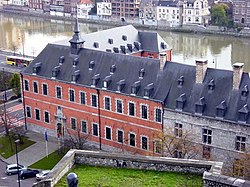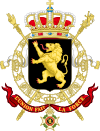Parliament of Wallonia
This article needs additional citations for verification. (November 2024) |
Parliament of Wallonia | |
|---|---|
 | |
| Type | |
| Type | |
| Leadership | |
President | |
| Structure | |
| Seats | 75 |
 | |
Political groups | Government (43)
Opposition (32) |
Length of term | 5 years |
| Elections | |
Last election | 9 June 2024 |
Next election | 2029 |
| Meeting place | |
 | |
| Saint-Gilles Hospice, Namur | |
| Website | |
| https://www.parlement-wallonie.be/ | |
The Parliament of Wallonia (French: Parlement de Wallonie, pronounced [paʁləmɑ̃ də walɔni]), or the Walloon Parliament (Parlement wallon, [paʁləmɑ̃ walɔ̃]) in the decrees, is the legislative body of Wallonia, one of the three self-governing regions of Belgium (the other two being Flanders and the Brussels-Capital Region). The parliament building, the former Hospice Saint-Gilles, is situated in Namur, the capital of Wallonia, at the symbolic confluence of the Meuse and the Sambre, the two main rivers of the most inhabited parts of Wallonia, the Sillon industriel. On the other side of the Meuse, facing the Parliament, is the Élysette, the seat of the Government of Wallonia.
History and names
[edit]A 1974 law on the temporary creation of regions installed a Walloon Regional Council (alongside a Flemish Regional Council), which were both abolished in 1977. At the creation of the first (permanent) regional assemblies in 1980 (second state reform), the body was also called "Walloon Regional Council" (Conseil régional wallon). Its members were the national representatives and senators elected in the Walloon Region, who thus by law held two offices simultaneously.
The fourth state reform (1993), transformed Belgium into a federal state and changed the "Walloon Regional Council" (Conseil régional wallon) into the "Council of the Walloon Region" (Conseil de la Région wallonne), which was directly elected for the first time on 21 May 1995. Shortly before these elections, in April 1995, the Council adopted a resolution to use the terms "Walloon Parliament" (Parlement wallon) and "Walloon deputies" (députés wallons).
A 2005 constitutional amendment revised the official terminology for all community and regional councils into community and regional parliaments, changing the "Council of the Walloon Region" into the "Walloon Parliament" (Parlement wallon).
In 2015, the Parliament opted to use the term "Parliament of Wallonia" (Parlement de Wallonie) instead of "Walloon Parliament".

Composition
[edit]All members of the Parliament of Wallonia are also members of the Parliament of the French Community, except for German-speaking members, who represent the German-speaking population and are advisory members of the Parliament of the German-speaking Community.
The parliament exercises several functions:
- It discusses and passes decrees, and they can take initiatives to draw them up. After this, decrees are sanctioned and promulgated by the Walloon Government.
- It controls the Walloon Government. Control is exercised via the vote.
- It ratifies the international treaties linked to its powers.
Compositions
[edit]2024–2029 (current)
[edit]| Affiliation | Members | |
|---|---|---|
| Mouvement Réformateur ("Reformist Movement") | 26 | |
| Parti Socialiste ("Socialist Party") | 19 | |
| Les Engagés ("The Committed Ones") | 17 | |
| Parti du Travail de Belgique ("Workers' Party of Belgium") | 8 | |
| Ecolo ("Environmentalist") | 5 | |
| Total | 75 | |
2019–2024
[edit]| Affiliation | Members | |
|---|---|---|
| Parti Socialiste ("Socialist Party") | 23 | |
| Mouvement Réformateur ("Reformist Movement") | 20 | |
| Ecolo ("Environmentalist") | 12 | |
| Parti du Travail de Belgique ("Workers' Party of Belgium") | 10 | |
| Centre démocrate humaniste ("Humanist Democratic Centre") | 10 | |
| Total | 75 | |
2014–2019
[edit]This is the composition of the Walloon Parliament following the 2014 regional election.
| Affiliation | Members | |
|---|---|---|
| Parti Socialiste ("Socialist Party") | 30 | |
| Mouvement Réformateur ("Reformist Movement") | 25 | |
| Centre démocrate humaniste ("Humanist Democratic Centre") | 13 | |
| Ecolo ("Environmentalist") | 4 | |
| Parti du Travail de Belgique ("Workers' Party of Belgium") | 2 | |
| Parti populaire ("People's Party") | 1 | |
| Total |
75 | |
2009–2014
[edit]This is the composition of the Walloon Parliament following the 2009 regional election.[1] The PS, Ecolo and CDH formed together a government.

| Affiliation | Members | |
|---|---|---|
| Parti Socialiste ("Socialist Party") | 29 | |
| Mouvement Réformateur ("Reformist Movement") | 19 | |
| Ecolo ("Environmentalist") | 14 | |
| Centre démocrate humaniste ("Humanist Democratic Centre") | 13 | |
| Total |
75 | |
2004–2009
[edit]This was the composition of the Walloon Parliament following the 2004 regional election. The PS and CDH formed together a government.

| Affiliation | Members | |
|---|---|---|
| Parti Socialiste ("Socialist Party") | 34 | |
| Mouvement Réformateur ("Reformist Movement") | 20 | |
| Centre démocrate humaniste ("Humanist Democratic Centre") | 14 | |
| Front National ("National Front") | 4 | |
| Ecolo ("Environmentalist") | 3 | |
| Total |
75 | |
1999–2004
[edit]This was the composition of the Walloon Parliament following the 1999 regional election. The PS, Ecolo and PRL formed together a government.

| Affiliation | Members | |
|---|---|---|
| Parti Socialiste ("Socialist Party") | 25 | |
| Parti Réformateur Libéral ("Reformist Movement") with Front Démocratique des Francophones ("Democratic Front of the Francophones") |
21 | |
| Ecolo ("Environmentalist") | 14 | |
| Parti Social Chrétien ("Christian Socialist Party") | 14 | |
| Front National ("National Front") | 1 | |
| Total |
75 | |
1995–1999
| 8 | 30 | 16 | 19 | 2 |
| Ecolo | PS | PSC | PRL + FDF | FN |
1999–2004
| 14 | 25 | 14 | 21 | 1 |
| Ecolo | PS | PSC | PRL + FDF | FN |
2004–2009
| 3 | 34 | 14 | 20 | 4 |
| Ecolo | PS | CDH | MR | FN |
2009–2014
| 14 | 29 | 13 | 19 |
| Ecolo | PS | CDH | MR |
2014–2019
| 2 | 4 | 30 | 13 | 25 | 1 |
| PTB–GO! | Ecolo | PS | CDH | MR | PP |
2019–present
| 10 | 12 | 23 | 10 | 20 |
| PTB–GO! | Ecolo | PS | CDH | MR |
Constituencies
[edit]The Walloon Parliament is the only Belgian parliament which still uses arrondissement-based constituencies. The federal Chamber of Representatives and the Flemish Parliament both merged theirs into larger province-based constituencies.
A January 2018 law merged both Luxembourg constituencies and reformed the Hainaut constituencies (* = boundaries changed), following a successful challenge by Ecolo to the Constitutional Court that constituencies with too few seats are unrepresentative.
| Province | Constituency | 1995 & 1999 | 2004 & 2009 | 2014 | 2019 |
|---|---|---|---|---|---|
| Liège | Liège | 14 | 13 | ||
| Verviers | 6 | ||||
| Huy-Waremme | 4 | ||||
| Hainaut | Charleroi | 10 | 9 | 10 * | |
| Thuin | 3 | ||||
| Tournai-Ath-Mouscron | 7 | 7 * | |||
| Mons | 6 | 5 | 5 * | ||
| Soignies | 4 | 5 * | |||
| Walloon Brabant | Nivelles | 7 | 8 | ||
| Namur | Namur | 6 | 7 | ||
| Dinant-Philippeville | 3 | 4 | |||
| Luxembourg | Arlon-Marche-Bastogne | 3 | 6 | ||
| Neufchâteau-Virton | 2 | ||||
See also
[edit]- Government of Wallonia
- Minister-President of Wallonia
- Flemish Parliament
- Parliament of the Brussels-Capital Region
- Parliament of the French Community
- Parliament of the German-speaking Community
References
[edit]- ^ "Résultat Parlement wallon 7 juin 2009" [Result of the Walloon Parliament, 7 June 2009] (in French).
External links
[edit]![]() Media related to Parliament of Wallonia at Wikimedia Commons
Media related to Parliament of Wallonia at Wikimedia Commons
- Official website (in French)

